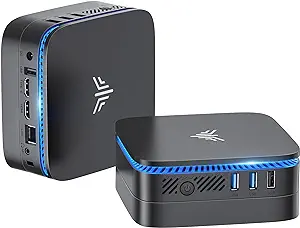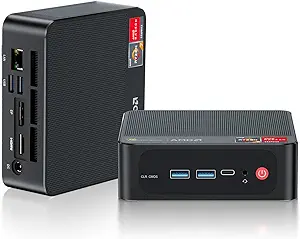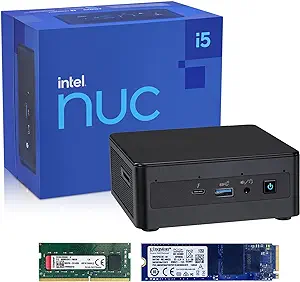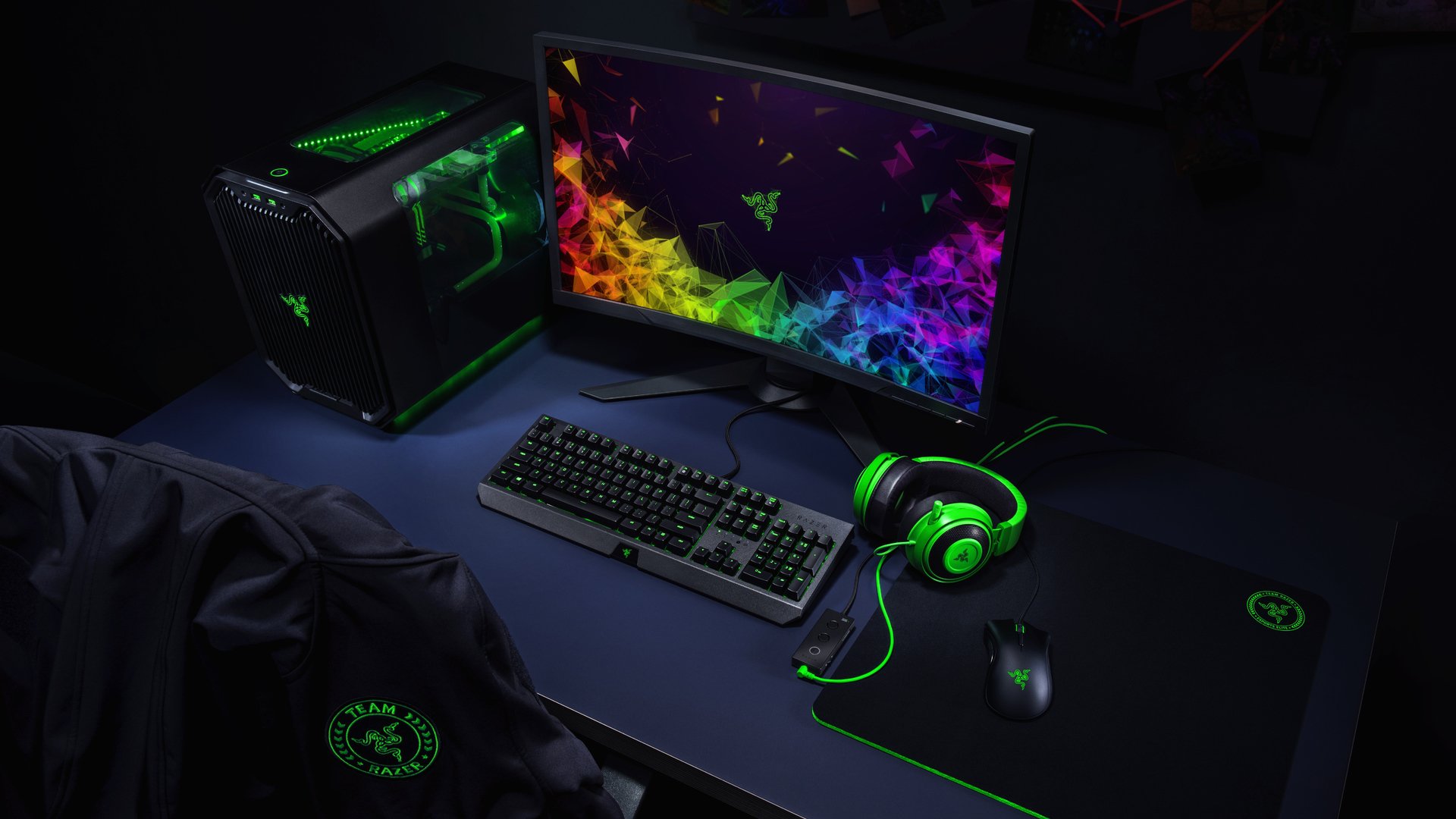Product at Glance
 | KAMRUI AK1PLUS Mini PC with Intel Alder | Check Price |
 | Beelink Mini PC AMD Ryzen 7 5700U | Check Price |
 | Intel NUC 11 Panther Canyon Mini PC | Check Price |
We’ve come a long way in terms of compact, versatile gaming solutions over the past few years. Welcome to the world of mini PCs – a growing category of gaming devices that combine portability, power, and space efficiency. Mini PCs, or SFF for short, have become popular not just for general computing but for gaming as well.
In this article, we will discuss the 3 best mini PCs for gaming, the benefits of mini PCs, and why they are a good option for gaming setups. So, let’s dive in and find out what mini PCs can do for gaming and how the gaming hardware landscape is evolving.
Are Mini PCs Good for Gaming?
Mini PCs are a popular choice among gamers and tech enthusiasts alike. Whether you’re a frequent traveler or looking for a space-saving solution to your gaming setup, mini PCs are a great choice for those who prioritize portability and space-saving design. Their small size and lightweight design make them easy to fit into tight spaces like apartments, dorms, or home offices. At the same time, their powerful hardware components can handle a wide range of games, from casual indie titles to high-end AAA games.
Let’s take a look at the three popular Mini PC models for gaming
1. KAMRUI AK1PLUS Mini PC with Intel Alder Lake
 | KAMRUI AK1PLUS Mini PC with Intel Alder Lake` | Check Price |
Equipped with an Intel Alder Lake N97 processor boasting speeds of up to 3.60 GHz, paired with 16GB of RAM and a 512GB ROM, the KAMRUI AK1PLUS offers impressive gaming capabilities. Its Intel Iris Xe graphics ensure smooth gameplay and stunning visuals, supporting 4K UHD resolution. Ideal for business, home office, and family use, it also functions as a NAS device.
2. Beelink Mini PC AMD Ryzen 7 5700U
 | Beelink Mini PC AMD Ryzen 7 5700U | Check Price |
Featuring an AMD Ryzen 7 5700U processor with 16GB DDR4 RAM and a 500GB NVMe SSD, the Beelink Mini PC delivers exceptional gaming performance. With Radeon Graphics and support for 4K@60Hz resolution, this Mini PC is suitable for home, office, and gaming purposes, offering impressive visuals and multitasking capabilities.
3. Intel NUC 11 Panther Canyon Mini PC
 | Intel NUC 11 Panther Canyon Mini PC | Check Price |
Powered by an 11th Gen Intel Core i5-1135G7 processor, coupled with 16GB of RAM and a 512GB SSD, the Intel NUC 11 Panther Canyon delivers robust gaming performance. With integrated Intel Iris Xe graphics and support for a 4K quad display, this Mini PC is perfect for home, business, and multimedia use, offering crisp visuals and seamless multitasking.
Pros and Cons of Gaming on Mini PCs
Gaming on Mini PCs presents a unique set of advantages and disadvantages that gamers should consider before making a decision. Let’s explore the pros and cons of gaming on Mini PCs.
Pros
1. Portability: Mini PCs are compact and lightweight, making them highly portable. Gamers can easily transport them for LAN parties, travel, or gaming sessions in different rooms of the house.
2. Space-saving Design: Mini PCs occupy minimal space, making them ideal for small gaming setups or environments where space is limited. They can be tucked away neatly on a desk or mounted behind a monitor to save valuable desk space.
3. Energy Efficiency: Mini PCs typically consume less power than traditional gaming rigs, resulting in lower energy bills and reduced environmental impact. This makes them a more eco-friendly gaming solution.
4. Silent Operation: Many Mini PCs feature passive or low-noise cooling systems, resulting in silent operation during gaming sessions. This can be beneficial for gamers who prefer a quiet gaming environment without the distraction of fan noise.
5. Aesthetics: Mini PCs often boast sleek and modern designs that complement contemporary gaming setups. Their compact form factor adds a touch of elegance to any gaming environment.
Cons
1. Limited Upgrade Options: Due to their compact size, Mini PCs may have limited upgrade options compared to traditional desktops. Upgrading components such as the GPU or CPU may be challenging or impossible in some cases.
2. Thermal Constraints: Mini PCs may struggle with heat dissipation due to their small form factor, leading to thermal throttling and performance degradation during prolonged gaming sessions. Proper cooling solutions are essential to mitigate this issue.
3. Hardware Limitations: While Mini PCs can handle many games, they may not offer the same level of performance as high-end gaming rigs. Gamers may need to compromise on graphical settings or resolution to achieve smooth gameplay.
4. Price-to-Performance Ratio: Mini PCs tend to be more expensive than traditional desktops on a price-to-performance basis. Gamers may pay a premium for the compact size and portability of Mini PCs.
5. Limited Peripheral Connectivity: Mini PCs may have fewer ports and connectivity options compared to larger desktops, limiting the number of peripherals that can be connected simultaneously.
Further Reading: Best ipad Gaming Controllers
Factors to Consider When Choosing a Mini PC for Gaming
Selecting the right Mini PC for gaming requires careful consideration of several key factors to ensure an optimal gaming experience. Here are the important factors to keep in mind when choosing a Mini PC for gaming:
1. Processor and Graphics Card
The CPU and GPU are crucial components that determine the gaming performance of a Mini PC. Look for Mini PCs equipped with powerful multi-core processors and dedicated graphics cards capable of handling modern games at desirable frame rates and resolutions.
2. RAM and Storage
Adequate RAM is essential for smooth gaming performance, especially when running multiple applications simultaneously. Opt for a Mini PC with ample RAM (8GB or more) to prevent performance bottlenecks. Additionally, consider the type and capacity of storage (SSD or HDD) for fast loading times and sufficient space to store games and other media files.
3. Connectivity Options
Evaluate the connectivity options available on the Mini PC, including USB ports, HDMI outputs, Ethernet ports, and audio jacks. Ensure that the Mini PC has sufficient ports to connect gaming peripherals such as keyboards, mice, controllers, and monitors.
4. Cooling Solutions
Efficient cooling is crucial to prevent overheating and maintain optimal performance during gaming sessions. Look for Mini PCs with effective cooling solutions such as heat sinks, fans, or liquid cooling systems to dissipate heat and prevent thermal throttling.
5. Form Factor and Design
Consider the form factor and design of the Mini PC, taking into account factors such as size, aesthetics, and mounting options. Choose a Mini PC that fits your gaming setup and complements your personal style preferences.
6. Price and Value
Set a budget for your Mini PC purchase and compare prices across different models to find the best value for your money. Balance the cost with the features and performance offered by the Mini PC to ensure you’re getting the most bang for your buck.
7. Reviews and User Feedback
Research reviews and user feedback for the Mini PC models you’re considering to gain insights into their performance, reliability, and overall user experience. Pay attention to factors such as gaming performance, build quality, and customer support.
Best Practices for Gaming on Mini PCs
Gaming on Mini PCs requires thoughtful planning and optimization to ensure a smooth and enjoyable gaming experience. Here are some best practices to maximize your gaming performance on Mini PCs:
1. Optimize Game Settings
Adjust in-game graphics settings to optimize performance without sacrificing visual quality. Lowering settings such as resolution, texture quality, and shadow detail can help improve frame rates on Mini PCs with less powerful hardware.
2. Monitor Temperature
Keep an eye on the temperature of your Mini PC during gaming sessions to prevent overheating. Use monitoring software to track CPU and GPU temperatures, and consider investing in additional cooling solutions such as laptop coolers or external fans if necessary.
3. Update Drivers and Software
Regularly update your Mini PC’s drivers and gaming software to ensure compatibility and performance optimization. Manufacturers often release driver updates that can improve stability, fix bugs, and enhance gaming performance.
4. Manage Background Processes
Close unnecessary background processes and applications before launching games to free up system resources and minimize performance bottlenecks. Use task manager or system optimization tools to identify and terminate resource-intensive processes.
5. Maintain Proper Ventilation
Ensure adequate airflow around your Mini PC by positioning it in a well-ventilated area with sufficient clearance for airflow. Avoid blocking air vents or placing the Mini PC in enclosed spaces that can impede cooling.
6. Regular Maintenance
Perform routine maintenance tasks such as cleaning dust and debris from air vents and internal components to prevent overheating and maintain optimal performance. Use compressed air or a soft brush to remove dust buildup from fans and heatsinks.
7. Opt for SSD Storage
Choose a Mini PC with solid-state drive (SSD) storage for faster loading times and improved system responsiveness. SSDs offer faster read/write speeds compared to traditional hard disk drives (HDDs), resulting in quicker game load times and smoother gameplay.
8. Consider External GPU Enclosures
If your Mini PC lacks a dedicated graphics card or you require more powerful GPU performance for gaming, consider investing in an external GPU enclosure. These enclosures allow you to connect a desktop-class GPU to your Mini PC via Thunderbolt or USB-C, providing a significant boost in gaming performance.
By following these best practices, gamers can optimize their gaming experience on Mini PCs and overcome potential performance limitations associated with compact form factors. With proper planning and optimization, Mini PCs can deliver immersive gaming experiences that rival larger gaming rigs.
FAQs
Q1. Can Mini PCs handle modern gaming titles?
Yes, many Mini PCs are capable of running modern gaming titles, although their performance may vary depending on the hardware specifications. High-end Mini PCs equipped with powerful CPUs and dedicated graphics cards can handle AAA games with smooth frame rates and high-quality visuals.
Q2. Are Mini PCs suitable for competitive gaming?
While Mini PCs can deliver respectable gaming performance, they may not be ideal for competitive gaming scenarios where every millisecond counts. Gamers who prioritize low input lag, high refresh rates, and ultra-smooth gameplay may prefer dedicated gaming rigs with higher-end hardware and specialized peripherals.
Q3. Can I upgrade the components in a Mini PC to improve gaming performance?
It depends on the specific model of the Mini PC. Some Mini PCs offer limited upgrade options due to their compact form factor and integrated components. However, certain models may allow upgrades such as adding more RAM, replacing storage drives, or even upgrading the CPU or GPU in some cases. Be sure to check the specifications and upgradeability options of your chosen Mini PC before making a purchase.
Q4. Do Mini PCs support peripherals such as gaming keyboards, mice, and controllers?
Yes, most Mini PCs come equipped with standard USB ports and support a wide range of gaming peripherals, including keyboards, mice, gamepads, and joysticks. Additionally, Mini PCs with Bluetooth connectivity can pair with wireless gaming peripherals for added convenience. Always check the connectivity options and compatibility of your Mini PC with your desired peripherals before purchasing.
Q5. Are Mini PCs suitable for VR gaming?
While some Mini PCs may offer VR-ready specifications, the compact form factor and integrated components of many Mini PCs may not provide the optimal performance required for a smooth VR gaming experience. Gamers interested in VR gaming may prefer dedicated gaming rigs with more powerful hardware and dedicated VR-ready graphics cards for the best possible experience.
Bottom Line
All in all, Mini PCs offer a convenient and space-saving gaming solution, suitable for gamers seeking portability and versatility. While they may not match the power of traditional gaming rigs, Mini PCs have improved significantly in performance and functionality, making them viable options for casual and mid-range gaming.
By considering factors like CPU and GPU performance, storage capacity, and connectivity options, gamers can find a Mini PC that suits their needs. With the right Mini PC and proper maintenance, gamers can enjoy immersive gaming experiences wherever they go.

